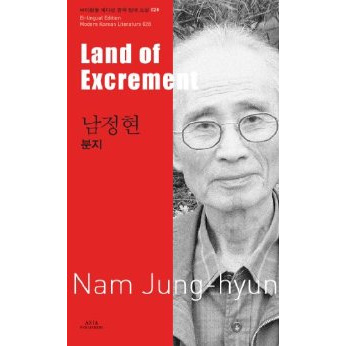 Land of Excrement by Nam Jung-hyun is an interesting and unusual book from the Bilingual Edition of Modern Korean Fiction. The first thing of interest may be the title, which is super-tricky, even in Korean. The Korean title for this book is 분지, which normally means “valley,” in Korean. In fact, every Korean I showed this book to translated its title into “valley.” However, by the portmanteau magic of Korean, this word is also a combination of dung (분 in about its 5th dictionary meaning) and the final syllable of land (육지) and so that is a proper, if confusing, title. Thus ends our Korean lesson for the day1.^^
Land of Excrement by Nam Jung-hyun is an interesting and unusual book from the Bilingual Edition of Modern Korean Fiction. The first thing of interest may be the title, which is super-tricky, even in Korean. The Korean title for this book is 분지, which normally means “valley,” in Korean. In fact, every Korean I showed this book to translated its title into “valley.” However, by the portmanteau magic of Korean, this word is also a combination of dung (분 in about its 5th dictionary meaning) and the final syllable of land (육지) and so that is a proper, if confusing, title. Thus ends our Korean lesson for the day1.^^
One of the other interesting things is that this is one of the few (only, really) expressly anti-US books that has been published in translation, a fact that is particularly remarkable given the time, during which the rather authoritarian Korean government was close partner to the US and did not brook any dissent. Which raises the funny (unfortunate?) story of how/why the book was published. In fact, Nam did not publish it, instead it was published by a North Korean journal, as part of the North’s propaganda campaign against the south and the US. The fact that he had not given permission to publish did not help poor Nam, who was immediately tossed into jail (as he was again in 1971, and 1974, being far from a favorite of the Park regime.
While the book is “anti US” in a sense, it is perhaps better to call Nam Jung-hyun a skeptic, particularly about the US. At the time, in 1965, the difference between the economic status of a GI and a Korean was massive, and the GI’s in general, treated Koreans poorly. In addition, and new and highly segregated class system was developing, all of which concerned Nam. So, Land of Excrement joins Cho Hae-il’s America (reviewed here), and a few other short stories in the handful of stories that attacked the role of the United States in Korea.
The story is relatively simple; it is the story of Hong Mansu. That name is important because it is a combination of a reference to the Korean hero Hong Gildong, who Hong Mansu claims to be directly related to, and the Korean word for ‘longevity,’ which is the one thing Hong does not seem to have. Hong is hiding on Mt. Hyangmi (roughly meaning “looking towards the US”) and he is about to be pulverized by the artillery and bombs of the United States Army.
He is subject to this fate, because he has asked the wife of the US serviceman to strip for him, because her husband has misused Hong’s sister as a concubine. Hong is justifiably angry not just for that, but also because in the post-war celebration a GI sexually assaulted Hong’ s mother, who subsequently went mad (abusing Hong along the way) and died. So he’s a pretty angry guy, and now he is waiting to be destroyed by artillery strikes for his extremely limited attempt at revenge. The book also touches on poverty, social striation, and the alienation of the poor.
All of which sounds pretty intense, but it’s carried off as lightly as it can be.. .no nasty details, nothing prurient, just a kind of “eye for an eye” thing. And it’s well written. Almost light-hearted. Land of Excrement is written as a conversation (mostly a monologue) between Hong and his dead mother and that’s important because up until this moment Hong has tried to forget his mother and her madness. So Hong is kind of making up with his mother at the very moment he is about to die. The book is also extremely well written (and translated!). Hong’s tone is nearly jaunty as he discusses his ancestors and nearly laughs at the amount of money the US is spending to destroy him. The tone is satirical and mocking, yet not heavy handed. Even dealing with the harshest topics, Nam has a delicate touch. In fact, he drops in some poignant commentary about how sweet the most boring things in life become when death is imminent, and if Hong seems to lose a little grip on reality as the bombardment approaches, that only seems natural given his predicament.
This is another score for the Bilingual Edition of Korean Modern Literature – a very important dissident voice translated into English.
——————————————
1
The real story is, of course, of my heroism^^ as I wandered from office to office at Dongguk trying to get someone who could explain it, and finally got the breakthrough when I speculated out loud that this was somehow related to “punji” sticks in Vietnam (sticks coated in dung, hidden in traps), and a professor said… “Oh.. yeah…!” and then explained the whole thing to me.


